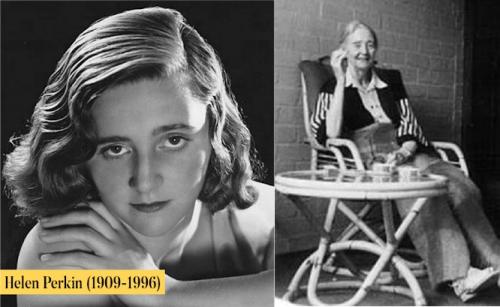LEGENDS OF
LIGHT MUSIC
Helen Perkin

HELEN PERKIN
1909-1996
By Philip L Scowcroft
2009 is a year of
musical anniversaries: Purcell,
Handel, Haydn, Avison,
Mendelssohn and Albeniz, to say
nothing of major 75th
celebrations like those of Elgar,
Holst and Delius. Not all those
have light music connections, but
one who has is Helen Perkin, born
in London in 1909 and trained at
the Royal College of Music. It
was while she was still at the
College that she was noticed by
John Ireland and coached by him
in his Piano Concerto which she
premiered to great acclaim in a
Henry Wood Prom in 1930. He
dedicated it to her but withdrew
the dedication when the
friendship soured; the Concerto
remained popular well into the
1950s, as I well remember, with
the composer there to acknowledge
the applause.
Perkin’s
career continued; she broadcast
regularly as a pianist. And she
composed, and some of her
portfolio may be reckoned as
light music. Not the two string
quartets, Cello Sonata or String
Trio, but several of her
published piano solos including
the Four Preludes and Village
Fair, in three movements (The
Crystal Gazer, The Puppet Show,
The Acrobat) the latter almost a
thematic suite in the Eric Coates
or Haydn Wood style, though it
was not, to my knowledge,
orchestrated. She also wrote some
film music and scores for two
children’s ballets for TV,
one of them entitled King’s
Cross (Calamity at Court), laid
out for violin, clarinet, bassoon
and piano. This was not published
but the BBC kept the ms at least
for a time, though I would not
care to guess whether it still
has it.
After the Second
War Perkin’s composing
career took an unusual twist by
her writing – like Ireland,
ironically – for brass band.
A Fandango was recorded on a GUS
Footwear Band LP in 1962 and of
her three suites for brass
(Cordell Suite, Carnival, and
Island Heritage) the latter two
were adopted as test pieces for
the Open Championships at Belle
Vue, Manchester, Carnival helping
Black Dyke to the victor’s
podium in 1957, Island Heritage
doing likewise for Fairey in
1962.
Perkin’s
music, serious or light, has
virtually sunk without trace: a
pity. Not the least intriguing
fact about her career is that in
earlier life she studied (on a
travelling scholarship) with
Anton Webern. Of how many
composers, at least part of whose
output was demonstrably light
music, could this be said?
This article first
appeared in the December 2009
issue of ‘Journal Into
Melody’.
|